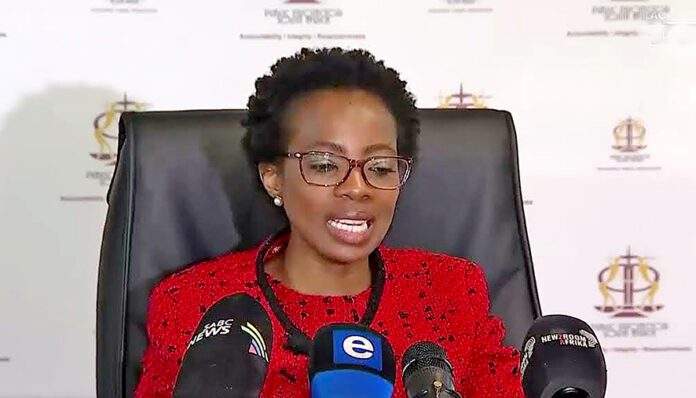The acting Public Protector relieved President Cyril Ramaphosa from the albatross of illegal dollars allegedly stolen on his Phala Phala game farm that previously forced the head of state to tender his resignation, and later withdraw it, after intense persuasion.
In the final Phala Phala report, Gcaleka absolved Ramaphosa of any wrongdoing. This includes an alleged violation of the ethics code and a possible conflict of interest. But Gcaleka referred further investigations to other state institutions because she had no jurisdiction.
Gcaleka did not deal with the origins or amounts of the allegedly stolen dollars, which were never banked for longer than 30 days.
The illegal foreign currency, which Ramaphosa valued at $580 000, was reportedly stolen while stashed inside a sofa on his farm in February 2020. This after a sweet cash deal to buy buffaloes on Christmas Day in 2019.
“Determination of the origin and exact amount of money stolen from Phala Phala farm was not within the scope of the public protector’s investigation. It is therefore incorrect to surmise that the Office of the Public Protector seems to be satisfied with the quantity and origin of the foreign currency stolen,” she said.
Figures in the public domain include Ramaphosa’s $580 000 claim and former intelligence chief Arthur Fraser’s claim of between $4-million and $8 -million.
Gcaleka’s investigation also excluded the question of whether Ramaphosa’s money was declared according to regulations. She said that on August 31 last year, she wrote to the South African Revenue Service (Sars) and requested it to indicate whether it was investigating allegations that the sum of foreign currency stolen from the Phala Phala farm could pertain to an illicit flow of cash, not declared to Sars for tax purposes.
She also requested that Sars furnish the public protector with the outcomes of their investigation. This was if Sars was investigating this matter in line with its mandate. Five days later, she said, Sars Commissioner Edward Kieswetter replied that viewed collectively, the
information requested by the public protector constituted taxpayer information, and the law generally prohibits Sars from disclosing taxpayer information to any person who is not a Sars official, and to do so is a criminal offence.
In a follow-up letter, Gcaleka requested clarity on whether Mustafa Mohamed Ibrahim Hazim, who allegedly paid for the buffaloes in cash, declared any foreign currency upon arrival or departure at the port of entry to Sars. Kieswetter indicated it would be an unlawful disclosure. However, he said Sars had referred the matter to the Financial Intelligence Centre and the South African Reserve Bank (SARB), respectively. This was with a view of obtaining additional information in this regard.
Her next letter landed on the desk of the SARB to check compliance with exchange control regulations regarding foreign currency stolen on the farm.
Sars replied that the matter was within the ambit of the financial surveillance department, the custodian of exchange controls and the public protector had no jurisdiction.
Gcaleka then wrote to the Financial Intelligence Centre but there was no information on the issues under investigation by the public protector.
Hawks unit head Gen Godfrey Lebeya confirmed a criminal investigation was underway. Two weeks ago, Lebeya said the investigation into the alleged theft of money on the farm was almost complete. The matter now rests within the ambit of the National Prosecution Authority (NPA).
“Currently, we have no less than 128 statements that we have obtained. The NPA is assessing the case,” noted Lebeya, adding that the final decision on whether or not to prosecute rested with the NPA since the Hawks did not work alone.
Gcaleka did not deal with the question of whether or not the crime had to be reported to the police. Instead, a police investigation was opened two years later.
Section 34 of the Prevention and Combating of Corrupt Activities Act (Precca) requires certain persons to report certain offences to the SAPS, specifically the Hawks, and failure to report is a criminal offence.
“The question of whether or not the president was absolved of any obligation to personally report the housebreaking is paramount to a determination of a violation of Section 34 (1) of Precca, and therefore amounting to an offence,” she said.
“As a result, the public protector is obliged to refer the matter of the president’s non-disclosure in terms of Section 34(1) of PRECCA to SAPS for investigation, who in this case, confirmed that the matter is under investigation by the [Hawks].”
She noted, however, that Ramaphosa’s bodyguard, Maj Gen Wally Rhoode testified that Ramaphosa reported both of these incidents to him as a police officer and as the head of the presidential protection services.
While Ramaphosa was off the hook, Rhoode was not so lucky. Gcaleka found that Rhoode abused state resources by embarking on an illegal investigation to recover stolen dollars.
After Fraser opened a criminal case against Ramaphosa and Rhoode in June last year, the opposition ATM, followed by the DA, requested the public protector’s office to investigate.
Follow @SundayWorldZA on Twitter @sundayworldza on Instagram, or like our Facebook Page, Sunday World, by clicking here for the latest breaking news in South Africa. To Subscribe to Sunday World, click here.



